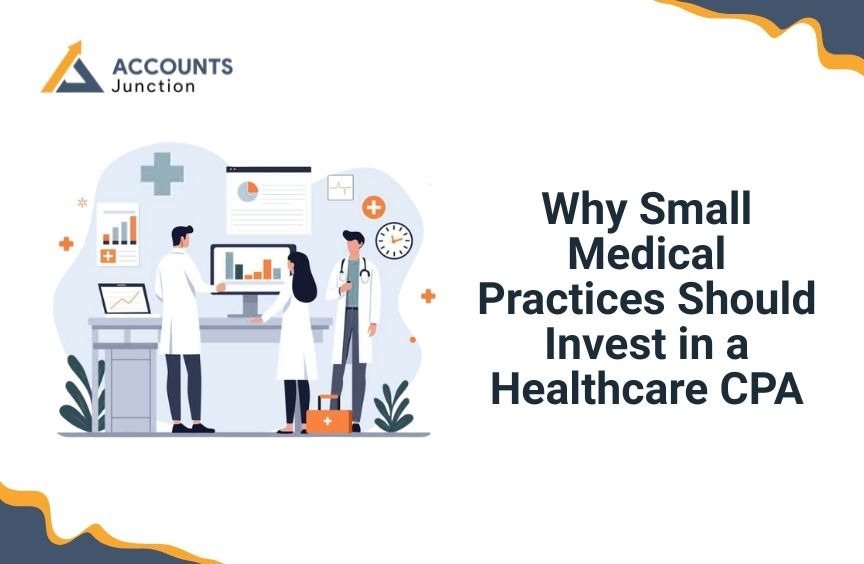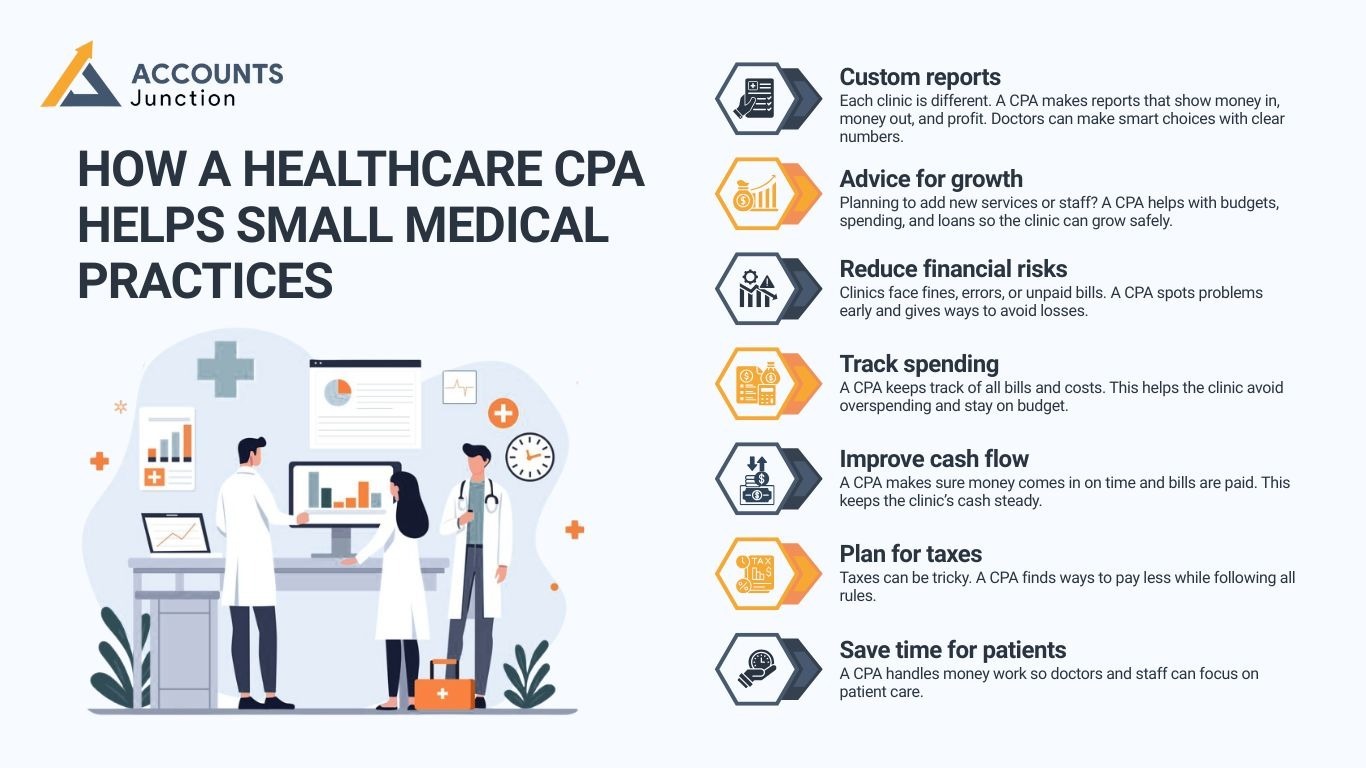
Why Small Medical Practices Should Invest in a Healthcare CPA
Running a small medical practice is not easy. Doctors and staff focus on patients, but money matters are just as important. Managing bills, taxes, and income can be hard. A Healthcare CPA knows the rules and needs of medical practices. They help manage money, file taxes correctly, and improve practice earnings.
In this blog, we will show why small medical practices should invest in a Healthcare CPA and how it can help them grow.
What is a Healthcare CPA?
A Healthcare CPA is an accountant who works with doctors and medical practices. They do more than regular accountants. They know the rules, taxes, and billing in healthcare.
How are they Different:
A regular accountant handles bills and taxes. A Healthcare CPA works with doctors and clinics to handle money in ways a regular accountant cannot.
- Handle patient billing: Track patient bills and payments. Check for mistakes. Make sure each payment is noted and done on time.
- Manage insurance claims: File claims for insurance. Follow up to get paid. Fix errors so the practice gets money fast.
- Follow healthcare rules: Know the rules for clinics. Check state and federal laws. Avoid fines and money problems.
- Save on taxes and costs: Look at all spending. Find tax breaks. Plan so the clinic keeps more money each year.
This helps clinics run well, avoid mistakes, and spend more time on patients.
Benefits of a Healthcare Accountant
A Healthcare CPA helps small medical practices in many ways. They save time, prevent errors, and help the practice run well.
- Accurate books and taxes: Medical rules are strict. A CPA keeps books correct and files taxes on time. This stops fines and money problems.
- Faster billing and payments: Billing patients and insurance can be slow and confusing. A CPA finds mistakes and speeds up payments. This gives doctors more money.
- Tax savings: Taxes can be high and tricky. A CPA looks for ways to save money while following all rules.
- Saves money in the long run: Hiring a CPA costs money at first. But they stop mistakes and help the clinic keep more money over time.
- Better cash flow: A CPA tracks money coming in and going out. This keeps the clinic’s money steady and avoids shortfalls.
- Planning for growth: A CPA helps plan for new services or staff. This makes it easier to grow without money problems.
- Fewer stress and errors: A CPA handles tricky money tasks. This gives doctors and staff more time to focus on patients.
How a Healthcare CPA Helps Small Medical Practices
Small clinics often have little time to manage money. A CPA works as a guide and advisor to help run the practice smoothly.
- Custom reports – Each clinic is different. A CPA makes reports that show money in, money out, and profit. Doctors can make smart choices with clear numbers.
- Advice for growth – Planning to add new services or staff? A CPA helps with budgets, spending, and loans so the clinic can grow safely.
- Reduce financial risks – Clinics face fines, errors, or unpaid bills. A CPA spots problems early and gives ways to avoid losses.
- Track spending – A CPA keeps track of all bills and costs. This helps the clinic avoid overspending and stay on budget.
- Improve cash flow – A CPA makes sure money comes in on time and bills are paid. This keeps the clinic’s cash steady.
- Plan for taxes – Taxes can be tricky. A CPA finds ways to pay less while following all rules.
- Save time for patients – A CPA handles money work so doctors and staff can focus on patient care.
Signs Your Practice Needs a Healthcare CPA
Not every small clinic knows when it is time to hire a Healthcare CPA. Here are some clear signs:
Errors in billing or accounting – Mistakes in bills, claims, or accounts happen often. A CPA can fix them and keep the records correct.
Confusing taxes – Taxes can be hard to understand. If filing feels tricky, a CPA can make it simple and avoid errors or fines.
Too busy to manage money – Doctors and staff spend most time on patients. If there is little time for bills or accounts, a CPA can handle it.
Plans to grow or add services – Expanding a clinic or adding staff need careful money planning. A CPA can help plan spending and budgets safely.
Trouble with cash flow or profit – If money in and out is unsteady, or profits are low, a CPA can track cash and improve income.
Want to save time and avoid stress – A CPA manages money work so the team can focus on patients, save time, and reduce worries.

Choosing the Right Healthcare Accountant
Not all CPAs are the same. Pick one with experience and skills for small clinics and doctors. Look for these qualities:
1. Experience Matters
- Choose a CPA who works with doctors and small clinics. They know the rules, taxes, and payments, and understand the clinic's money needs.
2. Clear Pricing
- Ask about costs upfront. Make sure fees are easy to understand and there are no hidden charges.
3. Good Communication
- A CPA should talk often and give advice. They should explain numbers clearly, not just handle paperwork.
4. Tech-Friendly
- A CPA should use software for billing, scheduling, and accounting. This keeps work fast and simple.
5. Honest and Trustworthy
- Pick a CPA who is honest and keeps all financial details safe. Trust is key to money matters.
6. Proactive Advice
- A CPA should give ideas to save money and improve clinic profit, not just report numbers after the fact.
7. Flexible and Available
- Look for a CPA who is easy to reach. They should adjust to your schedule and help when problems arise.
Misconceptions About Healthcare
Some doctors worry about hiring a CPA. Let’s clear the facts:
- “CPAs are too costly.”
A CPA costs money, but they save more by avoiding mistakes and taxes.
- “I can do it myself.”
Doctors are busy. Small errors can become costly. A CPA saves time and prevents losses.
- “Any CPA works”
Healthcare is unique. Only a Healthcare CPA knows the rules and billing well.
How a Healthcare Accountant Pays Off
Hiring a Healthcare CPA is an investment. Benefits include:
- Correct financial records
- Less stress for staff and doctors
- Faster payments and better cash flow
- Tax savings
- Advice for smart growth
In short, a CPA helps practices save money, avoid mistakes, and grow.
Integrating a Healthcare Accountant
Once hired, you need to work well with your CPA.
Set Clear Goals
- Explain what you need and expect. This keeps both sides on track.
Share Information Safely
- Give secure access to financial records and billing systems.
Regular Meetings
- Meet often to review numbers, plan strategies, and check progress.
Investing in a Healthcare CPA can significantly enhance the financial health of your medical practice. They offer expertise in managing finances, ensuring compliance, and supporting growth, allowing you to focus more on patient care.
At Accounts Junction, we help small medical practices manage finances with ease. We provide accurate medical billing, clear financial reports, and smart tax planning tailored to clinic rules. By handling these tasks, our team frees up doctors and staff to focus on patients, improve cash flow, and avoid costly mistakes. With our service, clinics can grow safely while keeping money matters under control. Partner with us to keep your clinic’s finances in order and achieve long-term success.
FAQs
1. What is a Healthcare CPA?
A Healthcare CPA is an accountant who works with doctors and clinics to handle money, taxes, and bills.
2. Why should small clinics hire one?
They save time, stop errors, and help clinics manage money and grow.
3. How is a Healthcare CPA different from a regular accountant?
They know clinic rules, insurance claims, and medical billing that regular accountants may not.
4. When should a clinic hire a CPA?
If there are billing errors, confusing taxes, low cash flow, or plans to grow, it is time.
5. Can a CPA help with taxes?
Yes. A CPA finds ways to pay less, follows all rules, and stops mistakes.
6. Will a CPA help with patient billing?
Yes. They check bills, fix mistakes, and make sure each payment is logged.
7. Can a CPA help with insurance claims?
Yes. They file claims, follow up, and fix errors so the clinic gets paid fast.
8. Does hiring a CPA save money?
Yes. They prevent errors, find tax breaks, and help the clinic keep more money.
9. How does a CPA help clinics plan growth?
They guide budgets, spending, and loans to safely add staff or new services.
10. Can a CPA reduce financial risks?
Yes. They spot mistakes early and help clinics avoid fines or lost money.
11. What qualities should I look for in a CPA?
Look for experience, clear pricing, good communication, tech skills, and trustworthiness.
12. How often should I meet with a CPA?
Meet regularly to review money, plan budgets, and check progress.
13. Can a CPA save staff time?
Yes. They handle money and work so doctors and staff can focus on patients.
14. Are CPAs expensive for small clinics?
They cost money at first, but save more by stopping errors and improving profit.
15. Do all CPAs know healthcare rules?
No. Only a Healthcare CPA knows clinic rules, billing, and taxes.
16. Can a CPA create financial reports?
Yes. They make simple reports showing income, spending, and profit to guide decisions.
17. How does a CPA make a clinic less stressful?
They handle money tasks, stop mistakes, and keep finances organized for the team.
